Exploring the Future of AI: Recap of bigX 2024
On September 19th, the tranquil Campus of the Institute for Science and Technology Austria (ISTA) transformed into a buzzing hub of exchange and innovation at the fully booked bigX 2024. Hosted by ISTA, the innovation ecosystem xista, and the Federation of Austrian Industries (IV), this year’s innovation exchange conference attracted a diverse crowd of visionary researchers from institutions like MIT, Oxford and UMass, and industry pioneers including Novartis, Siemens Energy, and AOP Health under the theme “The Future of AI.”
Markus Wanko, Managing Director of xista and Monika Henzinger, Vice President for Technology Transfer at ISTA opened with remarks, alongside federal representatives like Martin Kocher, Minister of Labor and Economy, and Isabella Meran-Waldstein, Director for Research, Technology, and Innovation of IV. Wanko emphasized the role of bigX in connecting research with real-world impact:
“bigX 2024 was a confluence of minds committed to pushing the boundaries of AI innovation. With vivid discourses, forward-looking research showcases, and stimulating panel discussions, the event delivered a panoramic view of AI’s future, highlighting its potential across diverse sectors”, said Wanko.
Key Moments & Highlights
The event’s keynote speaker, Nir Shavit, MIT professor and Neural Magic co-founder, captivated the audience with his address on the future of deep learning hardware in his talk “Tissue vs. Silicon: Musings on the Future of Deep Learning Hardware and Software”, he painted a vivid picture of the evolving deep learning landscape, comparing the potential of neural-inspired computing to traditional silicon-based paradigms.
Pioneering Research and Challenges
Following the keynote, the conference offered an array of specialized presentations addressing both theoretical and applied aspects of AI:
- AI Models & Architecture: A compelling video spotlight featured ISTA professors Dan Alistarh, Marco Mondelli, Francesco Locatello, and Christoph Lampert, as well as visiting professor Alex Bronstein. They presented avant-garde research on efficient, causal, and trustworthy machine learning models and their applications.
- Challenges and Perspectives: In a thought-provoking talk, industry experts such as Micah Adler from MIT CSAIL, Dan Alistarh from ISTA, Jillian Augustine from Anyline, and Marco Porak from IBM Austria discussed the pressing challenges and future directions of AI technology in commercial applications.
- AI in Life Science: A panorama of pioneering research highlighted AI’s transformative potential in life sciences. Presentations by ISTA professors like Florian Praetorius on de novo protein design, Sandra Siegert on microglial tracing in 3D, Johann Danzl on super-resolution microscopy, and Alicia Michael on visual proteomics showcased the intersection of AI with biology, neuroscience, and medicine.
- AI in Biotech & Pharma: A panel comprising Michael Bronstein from Oxford’s DeepMind, Troy Dale from Novartis, biochemist Alicia Michael from ISTA, and Carmen Visus from AOP Health elucidated the integration of AI within biotech and pharma industries, anticipating future innovations and collaborations.
Ethical and Regulatory Insights
The dialogue on AI would be incomplete without addressing its ethical and regulatory dimensions. A panel discussion featured Misha Glenny, Rector of the Institute for Human Sciences; Nadine Nehme, Co-Founder of Medicus.AI; Noah Oder from OECD.AI; and Christiane Wendehorst from the European Law Institute. This segment underscored the imperative of ethical governance and robust policy frameworks to steer AI towards a societal good.
Pioneering AI Across Industries and Borders
BigX 2024 was booked out within three weeks of its advertisement. Attracting involvement from key international talent like founding scientific director of the new research institute for AI and Biomedicine, Michael Bronstein. Bronstein, appointed this week as the first Scientific Director of AITHYRA, a new research institute for AI and Biomedicine in Vienna, founded by the Austrian Academy of Sciences (OEAW) and Boehringer Ingelheim Foundation, said, “AlphaFold, the biggest AI-driven breakthrough in structural biology, was trained on very expensive data collected by human scientist for human scientists’ use. I envision the next step will be designing new data sources for primary machine learning use.”
The event featured not only groundbreaking academic research but also attracted noteworthy interest from industry: Amongst the 300 attendees we welcomed industry representatives from Siemens Energy, Strabag, Novartis, AOP Health, Boehringer Ingelheim, and Takeda, among others.
Additionally, multiple xista science ventures portfolio startups involved with AI were represented: Contextflow, Infrared City, Syntropic, and nista.io. Keynote speaker Nir Shavit’s US-based startup Neural Magic which was co-founded with ISTA professor Dan Alistarh hosted a booth as well. This highlights the thriving ecosystem ISTA and xista have built to bridge the gap between cutting-edge science and industry applications.
A Beacon for exchange between science and economy
As the evening concluded with lively networking sessions, the energy and excitement for AI innovation were palpable. With collaborations initiated and new ideas sparked, bigX 2024 was not just an event—it was a collision of ideas.
“When I saw attendees head home with new ideas and connections, the promising horizons of AI innovation felt more tangible than ever. Looking ahead, bigX remains a beacon for interdisciplinary exchange between science and economy, aspiring to continually inspire and shape the trajectorby of technological progress.”, said Markus Wanko.
Looking ahead to 2025: The innovation exchange conference bigX2025 has been announced for 23rd of October 2025. Meanwhile, the trailblazing research and innovation at ISTA and xista, will continue to pave the way for groundbreaking technologies that drive progress across industries.
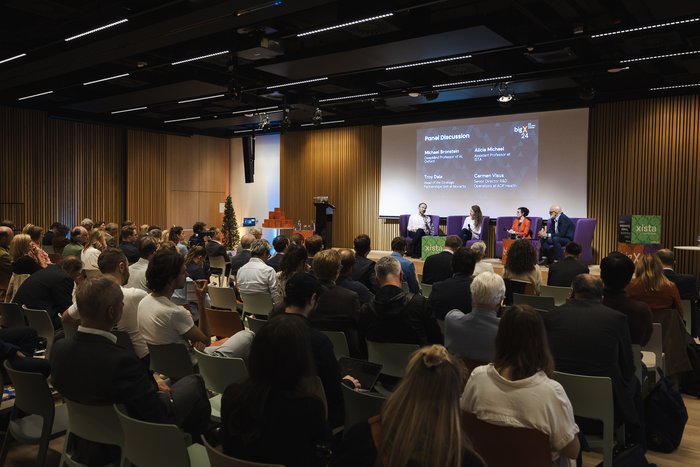

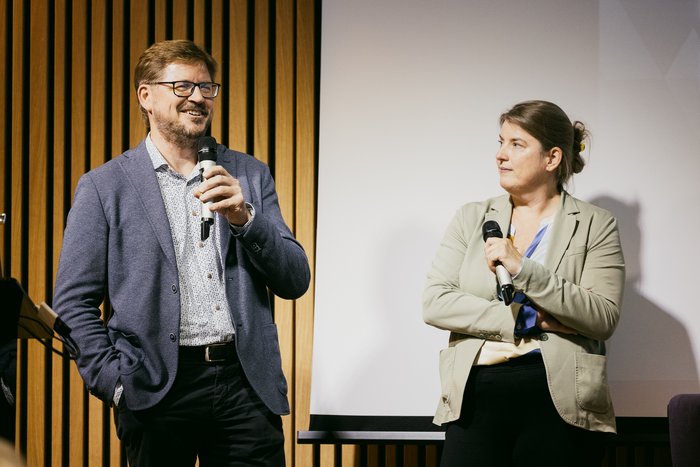
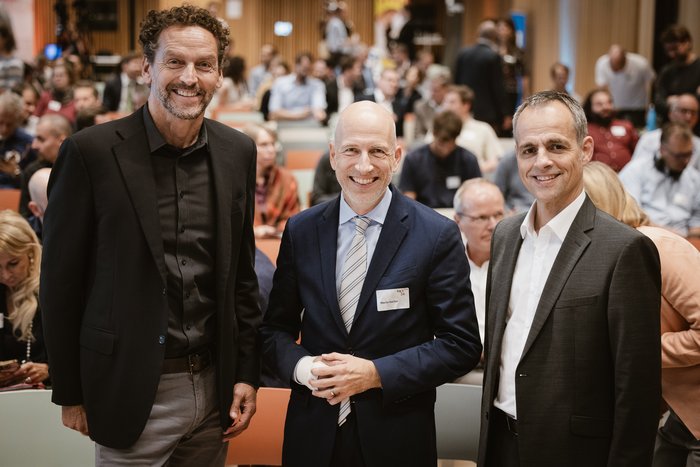
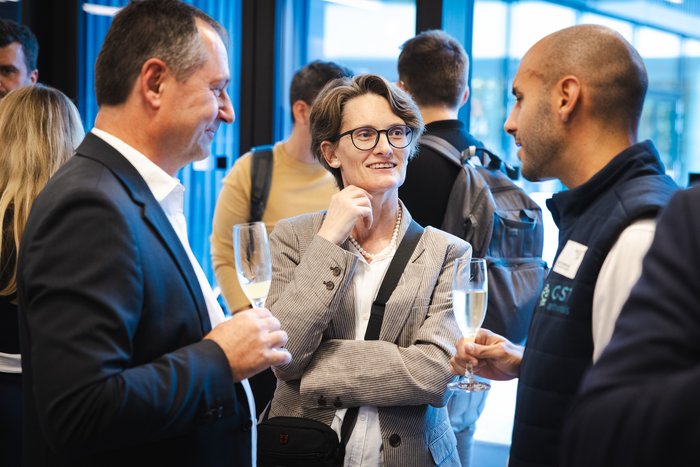
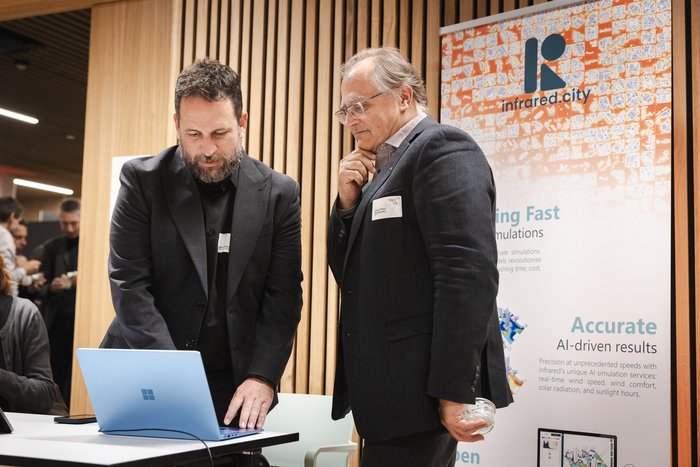
Further exciting news from our ecosystem

Exploring the Future of AI: Recap of bigX 2024
On September 19th, the tranquil Campus of the Institute for Science and Technology Austria (ISTA) transformed into a buzzing hub of exchange and innovation at the fully booked bigX 2024. Hosted by ISTA, the innovation ecosystem xista, and the Federation of Austrian Industries (IV), this year’s innovation exchange conference attracted a diverse crowd of visionary researchers from institutions like MIT, Oxford and UMass, and industry pioneers including Novartis, Siemens Energy, and AOP Health under the theme “The Future of AI.”
Markus Wanko, Managing Director of xista and Monika Henzinger, Vice President for Technology Transfer at ISTA opened with remarks, alongside federal representatives like Martin Kocher, Minister of Labor and Economy, and Isabella Meran-Waldstein, Director for Research, Technology, and Innovation of IV. Wanko emphasized the role of bigX in connecting research with real-world impact:
“bigX 2024 was a confluence of minds committed to pushing the boundaries of AI innovation. With vivid discourses, forward-looking research showcases, and stimulating panel discussions, the event delivered a panoramic view of AI’s future, highlighting its potential across diverse sectors”, said Wanko.
Key Moments & Highlights
The event’s keynote speaker, Nir Shavit, MIT professor and Neural Magic co-founder, captivated the audience with his address on the future of deep learning hardware in his talk “Tissue vs. Silicon: Musings on the Future of Deep Learning Hardware and Software”, he painted a vivid picture of the evolving deep learning landscape, comparing the potential of neural-inspired computing to traditional silicon-based paradigms.
Pioneering Research and Challenges
Following the keynote, the conference offered an array of specialized presentations addressing both theoretical and applied aspects of AI:
- AI Models & Architecture: A compelling video spotlight featured ISTA professors Dan Alistarh, Marco Mondelli, Francesco Locatello, and Christoph Lampert, as well as visiting professor Alex Bronstein. They presented avant-garde research on efficient, causal, and trustworthy machine learning models and their applications.
- Challenges and Perspectives: In a thought-provoking talk, industry experts such as Micah Adler from MIT CSAIL, Dan Alistarh from ISTA, Jillian Augustine from Anyline, and Marco Porak from IBM Austria discussed the pressing challenges and future directions of AI technology in commercial applications.
- AI in Life Science: A panorama of pioneering research highlighted AI’s transformative potential in life sciences. Presentations by ISTA professors like Florian Praetorius on de novo protein design, Sandra Siegert on microglial tracing in 3D, Johann Danzl on super-resolution microscopy, and Alicia Michael on visual proteomics showcased the intersection of AI with biology, neuroscience, and medicine.
- AI in Biotech & Pharma: A panel comprising Michael Bronstein from Oxford’s DeepMind, Troy Dale from Novartis, biochemist Alicia Michael from ISTA, and Carmen Visus from AOP Health elucidated the integration of AI within biotech and pharma industries, anticipating future innovations and collaborations.
Ethical and Regulatory Insights
The dialogue on AI would be incomplete without addressing its ethical and regulatory dimensions. A panel discussion featured Misha Glenny, Rector of the Institute for Human Sciences; Nadine Nehme, Co-Founder of Medicus.AI; Noah Oder from OECD.AI; and Christiane Wendehorst from the European Law Institute. This segment underscored the imperative of ethical governance and robust policy frameworks to steer AI towards a societal good.
Pioneering AI Across Industries and Borders
BigX 2024 was booked out within three weeks of its advertisement. Attracting involvement from key international talent like founding scientific director of the new research institute for AI and Biomedicine, Michael Bronstein. Bronstein, appointed this week as the first Scientific Director of AITHYRA, a new research institute for AI and Biomedicine in Vienna, founded by the Austrian Academy of Sciences (OEAW) and Boehringer Ingelheim Foundation, said, “AlphaFold, the biggest AI-driven breakthrough in structural biology, was trained on very expensive data collected by human scientist for human scientists’ use. I envision the next step will be designing new data sources for primary machine learning use.”
The event featured not only groundbreaking academic research but also attracted noteworthy interest from industry: Amongst the 300 attendees we welcomed industry representatives from Siemens Energy, Strabag, Novartis, AOP Health, Boehringer Ingelheim, and Takeda, among others.
Additionally, multiple xista science ventures portfolio startups involved with AI were represented: Contextflow, Infrared City, Syntropic, and nista.io. Keynote speaker Nir Shavit’s US-based startup Neural Magic which was co-founded with ISTA professor Dan Alistarh hosted a booth as well. This highlights the thriving ecosystem ISTA and xista have built to bridge the gap between cutting-edge science and industry applications.
A Beacon for exchange between science and economy
As the evening concluded with lively networking sessions, the energy and excitement for AI innovation were palpable. With collaborations initiated and new ideas sparked, bigX 2024 was not just an event—it was a collision of ideas.
“When I saw attendees head home with new ideas and connections, the promising horizons of AI innovation felt more tangible than ever. Looking ahead, bigX remains a beacon for interdisciplinary exchange between science and economy, aspiring to continually inspire and shape the trajectorby of technological progress.”, said Markus Wanko.
Looking ahead to 2025: The innovation exchange conference bigX2025 has been announced for 23rd of October 2025. Meanwhile, the trailblazing research and innovation at ISTA and xista, will continue to pave the way for groundbreaking technologies that drive progress across industries.





